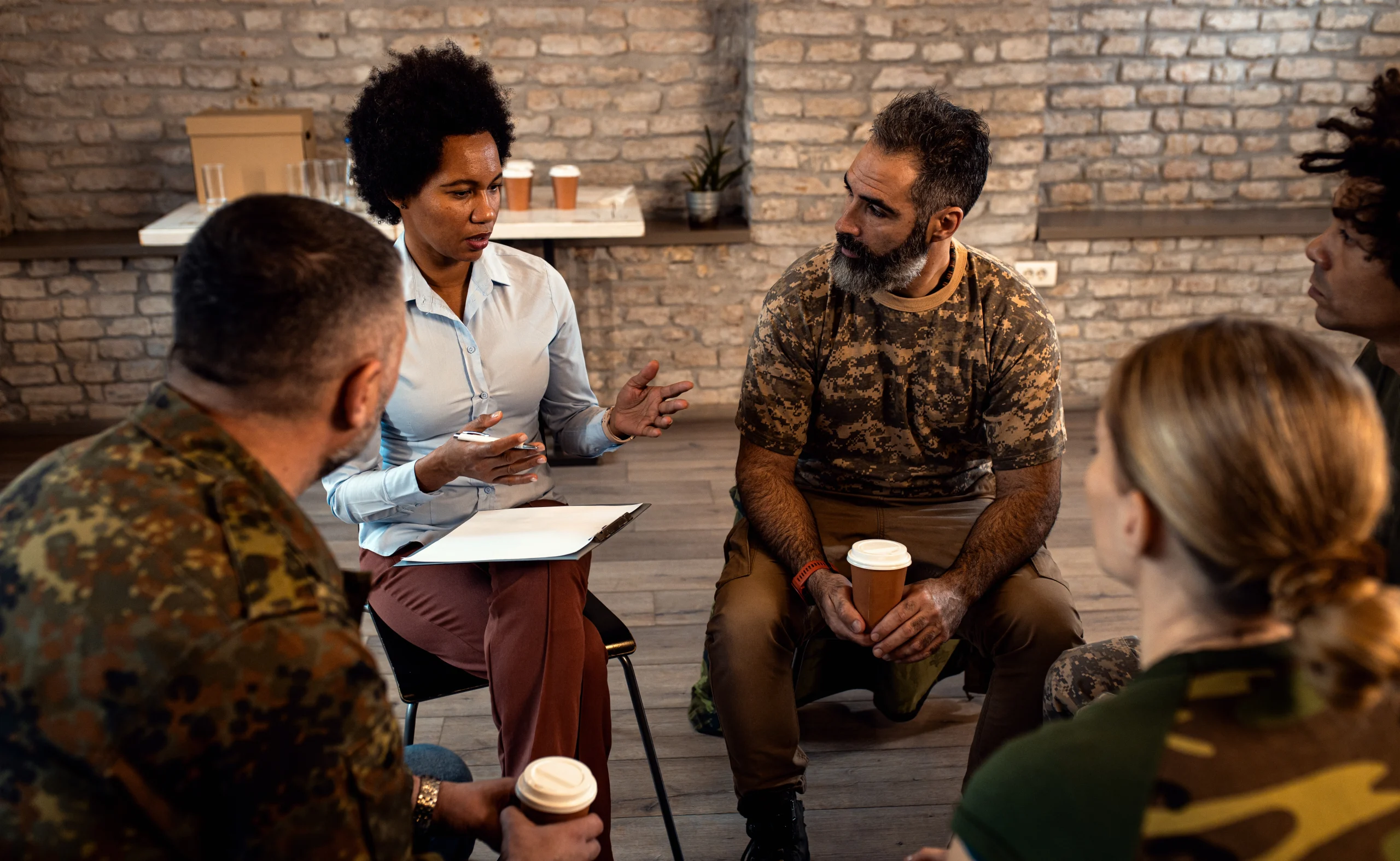Key Takeaways
Recent Posts
Categories
Breaking Trauma’s Grip: Coping Skills for PTSD Sufferers
Key Takeaways
The late afternoon sun glints off a soldier's helmet as he steps into the familiar warmth of his childhood home, greeted by the smell of his mother’s home-cooked meals and the laughter of his friends and family. To the untrained eye, he might appear the same as before - but while he seems as unchanged as his surroundings, the weight he carries is new. Though he tries to engage with the joy around him, sudden movements make him flinch. In conversation, he finds himself preoccupied, hypervigilant to any noises from outside - the sound of a car backfiring transports him right back to the stinging deserts of Afghanistan. At night, he lies awake tense and alert, explosions flashing behind his eyes. Sleep brings only nightmares. He is quick to anger, no longer the patient young man he was when he left. The soldier has come back with invisible wounds - in the form of post-traumatic stress disorder (PTSD) - that haunt his days and nights.
For many veterans, trauma lingers long after service ends. The sound of a helicopter or slam of a door can instantly transport them back to combat zones and scenes of trauma. These triggers manifest through flashbacks, panic attacks, and other symptoms of post-traumatic stress disorder (PTSD). While memories of trauma cannot simply be erased, there are numerous ways for the victims of PTSD to manage their symptoms. By learning effective coping skills for PTSD sufferers, veterans and other survivors can ease the grip of trauma and begin to regain their lives.
With time and practice, these skills allow veterans to master moments of anxiety and embrace the possibilities of the present. Healing from trauma means no longer letting the past define your future.
Understanding Post-Traumatic Stress Disorder (PTSD)
PTSD typically develops after experiencing a severe trauma - such as combat, an assault, a disaster, or a serious accident. For veterans, PTSD is most often traced to trauma exposure during military service. Even long after the event, PTSD can generate intrusive symptoms like flashbacks, nightmares, emotional numbness, avoidance, negative thinking, irritation, and hypervigilance.
The Science Behind the Disorder
PTSD is thought to stem from dysfunction in brain regions and neurochemical systems that process fear and stress. Trauma exposure sensitizes the amygdala’s fear circuits and the prefrontal cortex’s executive functions like decision making and impulse control, leading to an exaggerated stress response, hyperarousal, and constant re-experiencing of the event. Together, these and other neural network changes create disabling PTSD symptoms. Thankfully, treatment and effective coping skills create new neural pathways that can help counteract PTSD’s damage and help sufferers regain control over their brain functions.
Acute Stress Disorder vs. PTSD
Acute stress disorder (ASD) refers to trauma-related symptoms like dissociation and panic lasting 3 days to 1 month after an event. PTSD is only diagnosed when severe ASD symptoms last for more than a month. However, early intervention matters - practicing healthy coping from day one can help prevent ASD from progressing to full blown PTSD.
PTSD Coping Skills: the Basics
What Are Coping Skills?
Coping skills are defined as techniques and strategies to effectively manage stress, trauma, and other challenges. These skills include relaxation methods, emphasizing thoughts and behaviors that improve resilience, maintaining health and wellness, accessing support systems, and prioritizing self-care. Coping skills give PTSD sufferers ways to stabilize themselves during symptom flare-ups and promote ongoing healing.
Why Coping Skills Are Vital for Managing PTSD
Learning coping skills empowers PTSD sufferers to regain control over their trauma symptoms and reclaim their lives. Coping skills can help PTSD sufferers:
Calm a heightened stress response
Manage flashbacks, panic attacks, and anxiety
Improve sleep (which aids recovery)
Encourage positive thinking patterns
Prevent avoidance and social isolation
Build confidence and resilience
Relieve associated depression and anger
Reduce substance abuse risk
By practicing the below techniques, PTSD sufferers gain the tools they need to avoid being overwhelmed by distressing moments or sent into flashbacks by triggers. Coping skills foster recovery, helping traumatized veterans and others affected by PTSD break the cycle of suffering and progression of psychiatric disorders.

Specific Coping Techniques
Let's explore some of the most effective coping techniques mental health experts recommend for managing PTSD:
Grounding techniques mentally bring PTSD sufferers back into the present moment when they feel disoriented or distressed. Examples include focusing intently on your five senses, going through categories (such as foods, countries, etc) in alphabetical order, describing your surroundings, and breathing exercises. Some of the most effective grounding techniques include:
- Controlled belly breathing
- Naming 5 things you see, 4 you hear, 3 you feel, 2 you smell, 1 you taste
- Stating today’s date, place, time, your name and age out loud
- Describing your environment in detail using your senses
- Holding a comforting object like a stuffed animal or soft blanket
- Digging heels into the floor or clutching chair arms
- Listing categorizes like types of animals, sports, or cities
- Splashing cool water on your face
- Tensing and relaxing muscle groups
- Saying coping statements like “I am safe right now”
- Playing calming music
- Calling someone to talk you through it
Yoga is also excellent for grounding through controlled breathing and poses.
Through regular practice, mindfulness meditation can help enhance emotional regulation, psychological flexibility, and coping self-efficacy among PTSD sufferers. Mindfulness teaches acceptance of feelings without judgment or avoidance, and meditation calms the body and mind, enhancing the ability to manage stress. Apps like Calm and Headspace also provide excellent guided meditations.
This technique involves systematically tensing and relaxing muscle groups throughout the body to release tension. Studied benefits of progressive muscle relaxation include reduced heart rate, lower blood pressure, and decreased anxiety.
Writing about traumatic memories or related emotions through therapeutic journaling helps facilitate cognitive processing and meaning-making of the event. Studies show expressive writing consistently improves mental health outcomes for PTSD patients. Journaling provides a safe structure for confronting pain and organizing thoughts.
When stressed or triggered, PTSD sufferers often experience rapid, shallow breathing that activates the body’s fight-or-flight response. Deliberately slowing your breathing stimulates the parasympathetic nervous system, inducing calm. Useful techniques include deep belly breathing, counting breaths, exhaling longer than inhaling, and breathing in sync with your footsteps when walking.
PTSD often causes loss of interest in previously enjoyed activities. Making an effort to regularly schedule rewarding hobbies, social activities, and experiences boosts mood, motivation, and quality of life. Active leisure pursuits also improve physical and mental health.
Creative outlets like art, music, dance, drama, and writing allow safe expression of trauma-related memories and emotions that PTSD sufferers may struggle to articulate directly. The arts enhance coping through imagination, symbolic externalization, relaxation, and integrating traumatic material to make meaning.
Laughing and maintaining a humorous outlook bolsters resilience and ability to cope with PTSD symptoms. Humor enhances social bonding, provides alternate perspectives, alleviates distress, and counteracts negative moods. Seeking humorous experiences improves quality of life when managing a serious disorder.
Lifestyle Changes for Better PTSD Management
Adopting healthy lifestyle habits enhances physical and mental wellbeing, reinforcing one’s ability to cope with PTSD. Key areas to address include:
Regular aerobic exercise and strength training boosts neurotransmitters like serotonin and dopamine to stabilize mood. Exercise also enhances sleep quality, physical health, body image, and self-efficacy. Aim for 30-60 minutes of activity every day if possible.
Getting 7-9 hours of quality sleep allows the brain to consolidate learning and recover from stress. Maintain a consistent bedtime routine, limit electronics before bed, avoid stimulating substances, and create a restful environment. Manage nightmares and insomnia through coping strategies like grounding, meditation, and medication, if prescribed.
Eating regularly timed nutritious meals and staying hydrated stabilizes blood sugar and energy levels, while avoiding alcohol/caffeine improves sleep. Omega 3s and antioxidants found in foods like salmon, walnuts, and blueberries can help both reduce inflammation and support mental health.
Loneliness worsens PTSD symptoms while social support aids recovery. Regularly socialize with trusted friends and family - in person when possible, or via Zoom/phone. Feeling loved, understood and accepted relieves trauma’s isolating effects.
Spending time outdoors surrounded by nature can provide mental health benefits like reduced stress, anxiety, and rumination. Walking, mindfulness meditation, hiking, gardening, camping, and other nature activities are excellent for coping with PTSD.
Activities like meditation, tai chi, qi gong, and yoga integrate the mind, body, and spirit while building strength and flexibility. This mind-body connection calms the nervous system, boosts well-being, and enhances the ability to cope with PTSD symptoms.

The Importance of Support Systems for Managing PTSD
While mastering coping skills ultimately comes down to self-care, support from others makes the process easier. Connecting with compassionate communities reinforces resilience. You can connect with others by:
Surround yourself with positive people who validate your PTSD experience and genuinely care. Make mutual support a priority by also being present for loved ones. Try not to socially isolate. A strong support network makes coping with PTSD’s challenges significantly less intimidating.
Furthermore, educate loved ones about PTSD and your specific coping needs. Clearly communicate how they can best support you during hard times or trigger situations. Also, share ways you don’t want them to intervene or try to “fix” things. Setting expectations beforehand can prevent dangerous or uncomfortable situations.
Peer support groups connect you with others facing similar trauma histories and symptoms. They provide lived understanding, advice, accountability, belonging, and hope. Many communities offer in-person and virtual PTSD support groups.
Preventing Triggers and Managing Flashbacks
A key coping component is anticipating potential triggers that provoke upsetting PTSD symptoms like flashbacks, then developing strategies to prevent and manage those situations.
Recognize Personal Triggers
Identify sights, sounds, smells, places, emotions, situations, and bodily sensations unique to you that spark intrusive reactions because they subconsciously relate to past trauma. Common triggers include helicopters, fireworks, violent media, yelling, and feeling endangered.
Avoid Triggers When Possible
When triggers are identifiable, try reasonably avoiding or limiting exposure to them, especially early in treatment or when symptoms feel uncontrolled. Protect your peace and stability when vulnerable. However, avoiding every trigger is not realistic long-term recovery.
Manage Trigger Situations
When triggers cannot be fully avoided, have pre-planned coping strategies ready like deep breathing, grounding, leaving the situation, or reaching out for support. Managed, brief trigger exposure builds emotional stamina over time.
Practice Grounding
If a trigger leads to a flashback or panic attack, respond immediately with grounding techniques to regain a sense of safety and re-orient to the present. Describe your sensory surroundings, play calming music, engage in muscle relaxation, or try another coping strategy that’s most helpful to you.
Limit Drug/Alcohol Use
It may be tempting to use substances to numb flashback discomfort. But this prevents processing, creates dependency risk, and causes more long-term harm. Lean into healthy coping skills instead of avoiding through self-medication.
Frequently Asked Questions
There are several meaningful ways to help someone coping with PTSD, including:
- Educate yourself about PTSD so you can better understand their experiences and struggles. Learning about common symptoms, triggers, and treatments allows you to support them more sensitively.
- Offer emotional support by validating their feelings, listening without judgment, and showing empathy, care and reassurance. Don’t take their anger or isolation personally.
- Respect their boundaries and don’t force them to discuss trauma before they are ready. Let them share at their own pace.
Help reduce anxiety by avoiding triggering situations when possible and giving reminders or distractions if triggers occur. - Encourage positive coping strategies like therapy, support groups, journaling, exercise, meditation, etc.
- Check in about their treatment and medication, and offer to accompany them to appointments if desired.
- Suggest activities that increase joy, relaxation or normalcy in their life - but don’t push them to act “normal” before they are ready.
Having PTSD can significantly impact romantic relationships. Some tips for supporting a partner with PTSD include:
- Learn about common PTSD symptoms so you know what to expect and how to respond compassionately when challenges arise. Arm yourself with information.
- Be patient, flexible, and understanding when PTSD symptoms interfere in your relationship. Don’t take their stress responses personally.
- Encourage and remind them of positive coping strategies, but don’t try to “fix” them. They are responsible for managing their healing.
- Discuss triggers openly so you can help avoid them or prepare coping strategies when unavoidable. Work as a team.
- Give them space when needed but check in about isolation. Find a balance between closeness and autonomy based on their needs.
- Communicate clearly, honestly and sensitively about how their PTSD affects you and the relationship. Seek counseling together if needed.
- Don’t give up your own self-care. Get support so caretaking doesn't become unhealthy for you. Set boundaries if your needs aren’t being met.
- Focus on enjoying each other’s company and the strengths of your bond - don’t let PTSD rule your whole dynamic.
- Develop mutual understanding that PTSD symptoms are manageable, and have faith in their recovery process.
When post-traumatic stress disorder symptoms flare up into a panic attack, flashback, or dissociative episode, the following process may be able to help you ground yourself again:
- Take slow deep breaths, in through your nose and out through your mouth. Controlled breathing activates the parasympathetic nervous system to induce calm.
- Describe your surroundings in detail using all your senses - for example, name 5 things you see, 4 things you feel, 3 things you hear, 2 things you smell, and 1 thing you taste.
- Hold a comforting object like a soft blanket or favorite stuffed animal to soothe yourself.
- Press your feet firmly into the floor or dig your heels into the ground to feel physically anchored.
- Recite the letters of the alphabet very slowly or count backward from 100. This mental focus shifts your thoughts.
- Play calming music or listen to sounds from nature like ocean waves.
- If safe, step outside and look around, taking in the sights and sounds that indicate you are not in immediate danger.
- Remind yourself out loud that you are having a PTSD attack , which will pass.
Using these coping skills at the first signs of PTSD symptoms can help manage and shorten their duration. Over time and with practice, you will be able to stop PTSD flare ups from escalating into full panic attacks.
Grounding strategies help PTSD sufferers manage distressing symptoms like anxiety, flashbacks or disassociation by keeping them rooted in the present moment. Useful grounding techniques include yoga, controlled belly breathing, listing categories, splashing cool water on your face, and calling someone to talk you through a PTSD attack. Grounding brings PTSD sufferers back into the present moment and reality, de-escalating symptom severity. Regular practice builds the ability to self-manage distressing PTSD episodes as they occur.
Supporting a loved one with PTSD requires empathy, education, and care for your own mental health. Tips include: Listen without judgment, validate their struggles, research PTSD to gain understanding, encourage professional treatment, respect their boundaries, suggest positive coping strategies, watch for signs of crisis like substance abuse or self-harm, attend joint counseling to navigate relationship challenges, care for your own stress levels through self-care and support.
Neuroimaging shows PTSD impacts the amygdala (hyperactive fear response), hippocampus (diminished memory function), ventromedial prefrontal cortex (emotional regulation), and anterior cingulate cortex (decision making). This alters threat perception, increases stress reactivity, impairs memory consolidation, and reduces emotional control. Effective treatment can help counteract PTSD’s neurological effects.
The content on this blog is for informational purposes only and is not intended as medical advice. Always consult a medical professional for health-related issues.
YOU DON’T HAVE TO DO THIS ALONE
CONTACT VA DISABILITY LAWYERS
To learn more about our law firm, our services, how to access our veterans law resources, and more, contact us today.
You get a free consultation and we won’t charge you a dime until we’ve won your case.


